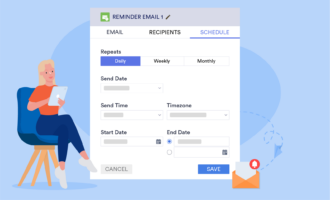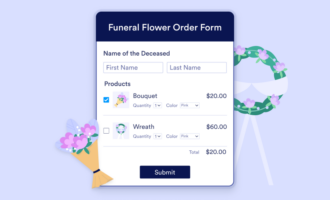How to organize a talent show
- Decide what kind of talent show you want to have
- Choose a date
- Create an organizing committee and subcommittees
- Secure the venue
- Recruit the talent and hold auditions
- Promote your talent show
- Enjoy the show!
Whether they’re at state fairs and high schools or on prime-time network television, talent shows are a popular staple of American culture.
They’re also a great way to raise money for a school or nonprofit organization, to use as a company team-building exercise, or simply to get the gang together for some good, old-fashioned, wholesome fun.
After all, who knows what talents lie hidden among your schoolmates, coworkers, family, and friends?
While organizing a talent show might seem daunting, it doesn’t have to be if you follow a simple, well thought-out plan. Whether you’re the lead organizer or part of a larger committee, this checklist will help you get started.
How to organize a talent show: A 7-step checklist
1. Decide what kind of talent show you want to have
Before you begin the rest of the planning, determine if your talent show will be a competition or a showcase, because this will direct your organization and planning.
In a competition talent show, you’ll be judging talent and awarding prizes, which means deciding on judging criteria for first, second, and third places and choosing prizes for each category. With a talent showcase, participants perform for the fun of it — no one receives prizes.
In either case, you’ll also need to decide what kind of acts are eligible, whether that’s singing, dancing, comedy, magic, martial arts, juggling, acting, playing an instrument, or a mix.
See how Falcon Events successfully managed their event with Jotform. Gain insights and tips to make your talent show a standout success.
2. Choose a date
If possible, choose a date that’s at least 10 months out to give you and everyone on your committees enough time to plan, organize, and make space for the inevitable hiccups that are bound to occur along the way.
Also build in plenty of lead time to audition talent, allow performers to rehearse and perfect their acts, and market and promote the show. While you may not have 10 months to plan and organize your talent show, the longer the runway you give yourself, the better.
3. Create an organizing committee and subcommittees
It’s a good idea to create an overall planning or steering committee and subcommittees for each talent show function. For example, your subcommittees could include
- Talent recruitment
- Rehearsal and talent management
- Refreshments and other intermission organization
- Marketing and promotion
- Budget planning
- Prize management
- Light, sound, and other technical coordination.
Those are just a few areas you need to plan for.
4. Secure the venue
The number of acts that you’ll allow to perform, the kind of tech setup you’ll need for those acts, and your expected audience size will all determine the type of venue you’ll need.
If you’re planning a school talent show, the venue is typically a school auditorium or gymnasium. For company talent shows, it could be a large conference room. For a nonprofit, you may want to reserve a community center, or if the weather is nice on your chosen date, an outdoor show under event tents could work well.
5. Recruit the talent and hold auditions
Now it’s time to get your talent on deck. The talent committee will need to set up a system for finding, auditioning, and selecting talent.
Put the word out within your school or organization, and if the talent show is open to outside participants, share participation requirements and deadlines on your website, via email and social media, in local free listing services, and through an announcement in the local newspaper.
Be sure to include a deadline for responses.
You may wonder why you need to hold auditions if your talent show is competition-based rather than showcase- or exhibition-based. Holding auditions is a great way to see how many acts in each category — singing, dancing, comedy, etc. — are interested in participating, and it can help you plan for an ideal mix of acts.
And while you’re recruiting talent, don’t forget to choose a charismatic emcee with good stage presence to keep the crowd engaged throughout the show.
Jotform offers a variety of free contest registration forms that allow participants to sign up and submit entries online, including the ability to upload demo videos and voice recordings. Submissions will be safely stored in your Jotform account, which judges can access from any device. If you need to collect contest entry fees, there are a number of payment processor integrations to choose from.
If you’re going to hold your event publicly and online, you can handle voting for winners with online forms too. People can vote for their favorite act or performer at the show. Check out our voting templates and award forms.
6. Promote your talent show
Once you’ve lined up the talent, locked down a venue, and scheduled a firm date in your calendar, you can begin promoting your talent show.
Start the process well in advance to create buzz and build excitement. You can start promoting the event early on without sharing all the details to create an air of mystery and curiosity around it, and when it’s a bit closer to the date of the show, you can begin sharing specifics via email, social media, flyers, posters, a press release or local news announcement, and so on.
Be sure to ask the performers to spread the word and share it on their social channels as well.
7. Enjoy the show!
The big day is finally here. You and your committees have planned every detail. Each act has rehearsed and is eager to perform, and all the players — from primary talent to backstage support — are ready to pull together to wow the audience.
Now all that’s left to do is enjoy the show — and celebrate afterward, of course.

























































Send Comment:
5 Comments:
More than a year ago
The tips were relevant and timely to support me with my planning for an Easter event.
Thanks and all the best to you Kimberly and your team.
More than a year ago
This will be a first for me.
Thanks, I'm so very excited I found help for writing an outline.
GODSPEED to you.🙏🙆🌄🌃🌆🌉
More than a year ago
Am planing a school musicTalent show, and I will need your help.
More than a year ago
So lovely, and very helpful thanks a lot.
More than a year ago
I want to organize mybshow in refugees camp of best singar am looking for sponcer